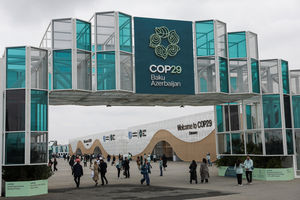Africa urges action on climate finance as draft text sparks debate at COP29

Environmental activists protest to urge world leaders to commit to a strong climate finance deal during the United Nations Climate Change Conference (COP29), in Baku, Azerbaijan November 16, 2024.
In Baku, Azerbaijan
A new climate finance text (draft agreement) is out with less than 48 hours left before ministers from the different countries arrive and sign off on what the negotiators have agreed on.
In the context of climate negotiations, a draft text is a preliminary document that outlines proposed agreements, commitments and policies to address climate issues. These texts are crafted by selected representatives, often called co-chairs, who lead specific negotiation streams.
For example, a draft text might address climate finance, emissions reduction targets, adaptation strategies, or loss and damage support. It is the draft texts that provide a structured basis for countries to negotiate specific language, goals and commitments.
African nations are pressing for decisive action on climate finance, following the release of the third draft text on the New Collective Quantified Goal (NCQG). The African Group of Negotiators (AGN), representing African countries, has expressed both hope and frustration, warning that the text still falls short of addressing the continent’s pressing adaptation needs and long-term resilience goals.
The NCQG framework is intended to replace the Paris Agreement’s $100 billion annual climate finance target, a pledge that developed nations have consistently failed to meet. At stake is a comprehensive funding mechanism to help developing nations mitigate and adapt to the worst impacts of climate change.
Africa, which contributes less than four per cent of global greenhouse gas emissions but bears the brunt of climate impacts, has called for 1.3 trillion US dollars in annual climate finance. At least half of this amount, African negotiators demand, must come in the form of grants or concessional funding.
“For Africa, simply reaching an agreement for the sake of agreement is not good enough,” said Ambassador Ali Mohamed, Chair of the AGN and Kenya’s Special Envoy for Climate Change.
“The new climate finance goal must offer confidence that developed countries will support the delivery of real-world outcomes in the response to climate change by developing countries,” he added.
The AGN has identified some shortcomings in the draft text. First, the proposed financial targets fall short of Africa’s demand, raising concerns that the framework will not adequately support the continent’s adaptation and mitigation needs. Additionally, while the text acknowledges the principle of common but differentiated responsibilities, African negotiators are pushing for stronger accountability mechanisms to ensure developed nations deliver on their promises. The AGN has also criticised the lack of specificity in the draft regarding how funds will reach vulnerable communities and support critical priorities like adaptation, loss and damage, and climate-resilient infrastructure.
Complicated and unpredictable financing mechanisms are another sticking point for African negotiators, who have stressed the need for accessible and reliable funding streams. Without clear commitments on these fronts, they argue, the NCQG risks being another unfulfilled promise.
“African nations are facing mounting costs due to climate impacts,” Mohamed said. “Adaptation is no longer an option; it is a necessity. We need reliable and predictable funding to ensure sustainable development and protect millions of livelihoods.”
Africa’s priorities at COP29 extend beyond financial commitments.
The negotiators have consistently called for equitable solutions rooted in climate justice, ensuring that resources reach the people and regions most affected by the climate crisis. For the continent, this includes direct funding for adaptation projects that strengthen resilience in communities, support for sustainable agricultural practices to address food insecurity caused by erratic weather, and investments in renewable energy to facilitate a just transition away from fossil fuels.
The AGN’s demands are also grounded in the principle of equity, calling on developed nations to take greater responsibility for their historical contributions to global emissions. African negotiators have repeatedly emphasised that developed countries must meet their financial obligations and provide the resources necessary to support those most vulnerable to the impacts of climate change.
The AGN has also expressed frustration with the lack of significant progress during the last six days of COP29 and has warned of the risks of symbolic agreements that fail to address the scale of the crisis. African negotiators insist that any deal must include robust accountability mechanisms to ensure that commitments are honoured, and financial flows are directed to the areas of greatest need.
As the second week of COP29 begins on Monday, negotiators face mounting pressure to finalise a deal that balances ambition with feasibility.
African leaders have warned against the dangers of settling for symbolic agreements that lack the substance needed to deliver real outcomes. Mohamed reiterated that Africa is not at COP29 to secure just any deal but one that ensures vulnerable nations receive the support they need to cope with and mitigate climate impacts.
“We are hopeful that through continued dialogue and a commitment to fair outcomes, we can achieve a comprehensive agreement that truly addresses the needs of Africa and the Global South,” Mohamed concluded. “Our children and generations to come deserve a future in which climate action is not just aspirational but tangible, and where the burden of this crisis is shared fairly.”
As negotiations intensify in Baku, the world watches to see whether COP29 will deliver a climate finance framework that moves beyond rhetoric to actions. Next week, we know.




